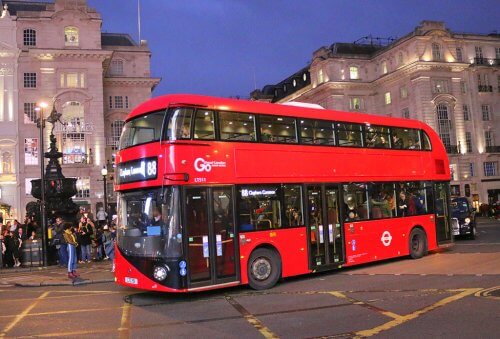Following a blunt ultimatum by Mayor of London Sadiq Khan to ministers to agree an emergency bailout for Transport for London (TfL), the government has stepped in to provide financial support to the capital’s transport operator
ITV News reported on Thursday 14 May that the Mayor had warned that the government had until the ‘close of play’ to come up with a rescue package to stop TfL running out of cash.
It had already been reported that TfL was spending £600m a month but had lost 90% of its normal income from fares, advertising and the Congestion Charge, and around 7,000 TfL staff had been furloughed since the beginning of the month, giving savings of £16m.

The Local Government Act requires TfL to hold sufficient cash to cover two months’ operating costs, which amounts to around £1.2bn. Prior to the pandemic, the operator had around £2.2bn in reserve.
However, Keith Prince, the Conservative Transport Spokesman on the London Assembly, accused Sadiq Khan of ‘playing politics with people’s lives’: “Sadiq Khan’s ultimatum is unhelpful and alarmist and exactly the sort of political gameplay that no Londoner wants to see from their Mayor during a crisis. Transport for London will inevitably need a bailout to continue operating during this crisis, but TfL has £1.2 billion in reserves which is enough to run the network for two months.
“[He] needs to stop playing politics with people’s lives. Many Londoners rely on public transport to travel across our city, and if the Mayor decides to cut the Tube and bus service again to make a political point, he will put putting peoples’ health, livelihoods, and our city’s struggling economy at risk. Instead of making irresponsible comments on the radio, the Mayor should be engaging constructively with the Government to secure a bailout and restore London’s public transport network.”
£1.6bn cash injection brings fares freeze to an end
TfL is set to receive a grant of £1.1m, along with loans of over £500m. London’s Evening Standard highlighted that the deal would bring an end to London’s four year long fare freeze, with fares set to rise by one percent above the Retail Price Index from next year, whilst holders of London’s Freedom Pass, which gives older people free travel, will no longer be able to travel during peak hours. The latter is reported to be a temporary measure, to safeguard older people by keeping them off transport at the busiest times, and is expected to be reversed after the pandemic ends.
Welcoming the announcement, London’s Transport Commissioner Mike Brown MVO said in a statement: “I welcome this support from Government which will help us continue to get London moving and working again, safely and sustainably. London’s transport network is absolutely fundamental to the economic, social and environmental health of the Capital. Throughout the pandemic, transport workers have played a heroic role in the response to the virus –ensuring NHS and care staff have been able to get to work and save lives.
“We have worked closely with the Government and Mayor as part of the national effort to fight the virus, rapidly reducing passenger numbers to levels not seen for 100 years. This has meant that our fare and other revenue has fallen by 90 per cent.
“We now need to help London recover as restrictions on movement are gradually eased, with public health and more active forms of travel at the forefront of our thinking.
“We have been operating up to 70 per cent of peak Tube services and over 80 percent of bus services with many of our staff ill, shielding or in self isolation. From next week we will further increase services beyond this as we progressively build towards restoring services to pre-covid levels.
“To maintain social distancing wherever possible, the transport network needs to operate differently during this extraordinary period. In line with advice from the Government and Mayor we are encouraging people who can work from home to continue to do so to enable the people who must travel to do so safely. We are asking everyone to try and avoid the busiest times to support social distancing wherever possible, to wear non-medical face coverings when they do need to use public transport, and to walk and cycle whenever possible. We are providing extensive new cycling and walking facilities to support journeys by these means.
“Enormous challenges remain, including agreeing longer term sustainable funding for transport in the Capital. In the meantime, we will continue to do everything in our power to help deliver a successful recovery for our great city.”
Congestion charge and ULEZ re-introduced
In addition, the Mayor of London’s office has announced that the Congestion Charge and ULEZ will be re-introduced from Monday 18 May. It has also proposed that as a temporary measure and to support the transformation of London’s streets, the Congestion Charge will increase to £15 and the hours of operation extended as part of a package of temporary changes. These changes, it said in a statement, will be monitored and form part of a wider review of the Congestion Charge as agreed with the Government as part of the TfL funding deal.
Proposals include increasing the Congestion Charge to £15 and extending its hours of operation to 7am to 10pm, seven days a week, from 22 June, to encourage Londoners not to make unnecessary car journeys. It is expected that this will reduce journeys within the Congestion Charge zone by a third, which the Mayor’s office said would reduce air pollution in central London compared to pre-coronavirus levels and help tackle the climate emergency.
TfL will also be temporarily extending the Congestion Charge reimbursement scheme to continue to support NHS and care home staff who work in the Congestion Charge zone, who will be reimbursed for journeys relating to coronavirus, including for their journeys to and from work.

